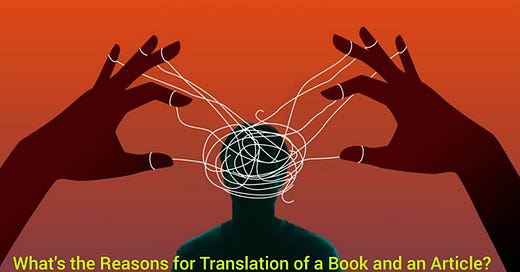What Are the Reasons for Translation of a Book and an Article?
Translation with the intention to prescribe scientific, political, social, and cultural solutions when the society has reached a dead end
By Sina Jahandideh and Translated by Asadullah Jafari “Pezhman”
A translator chooses a work-books or an article-essay to translate for various reasons, some of which I will mention below:
Translation with the intention lack of critical scientific sources and referents.
Translation with the intention of discussion and enlightenment.
Translation with the intention of the translator’s interest in peaceful cultural courses or due to the interest in famous personalities of the world.
Translation with the intention to defame or confirm political, social, cultural, and artistic figures.
Translation with the intention of creating myths.
Translation with the intention to introduce books or forgotten cultural and literary figures in literary criticism.
Translation with the intention to promote nationalist ideas that manifests himself/herself in the linguistic forms of “Overwriting or Rewriting” and the expansion of historical and national elements.
Translation with the intention of immediate sales of books and achieving very immediate financial and economic profits.
Translation with the intention to familiarize people with emerging scientific, political, cultural, and ethical ideas.
Translation with the intention of political struggles; In this translation method, the translator may target religion, government, thought, and dominant and hegemonic discourses, sometimes for reformation and sometimes for destruction or defamation.
Translation with the intention to spread peace, equality, democracy, avoiding violence and war crimes, defending the rights of children, women, workers, and minorities who have been assaulted, etc...
Translation with the intention to project violence and get rid of suppressed psychological and social complexes; that is, this type of translation is also called “translation therapy.”
Translation with the intention of fame and “awareness” positions for nations, centers, schools, and communities.
Translation with the intention of familiarity with foreign languages, inter-states, and international communication.
Translation intends to theorize with other people’s thoughts and gain fame with thinking people familiar with new and contemporary theories of the world.
Translation with the intention to change the scientific impasses of universities, scientific centers, and schools.
Translation with the intention of teaching and training new generations in scientific and research centers of the country and society.
Translation with the intention to prescribe scientific, political, social, and cultural solutions when the society has reached a dead end.
And ...
Undoubtedly, from what I have mentioned, some of these intentions are seriously overlapping, and no translator thinks of only one factor. It is possible that the translator combines several purposes.





